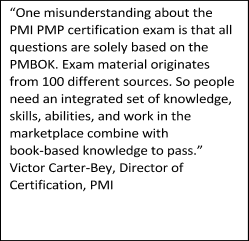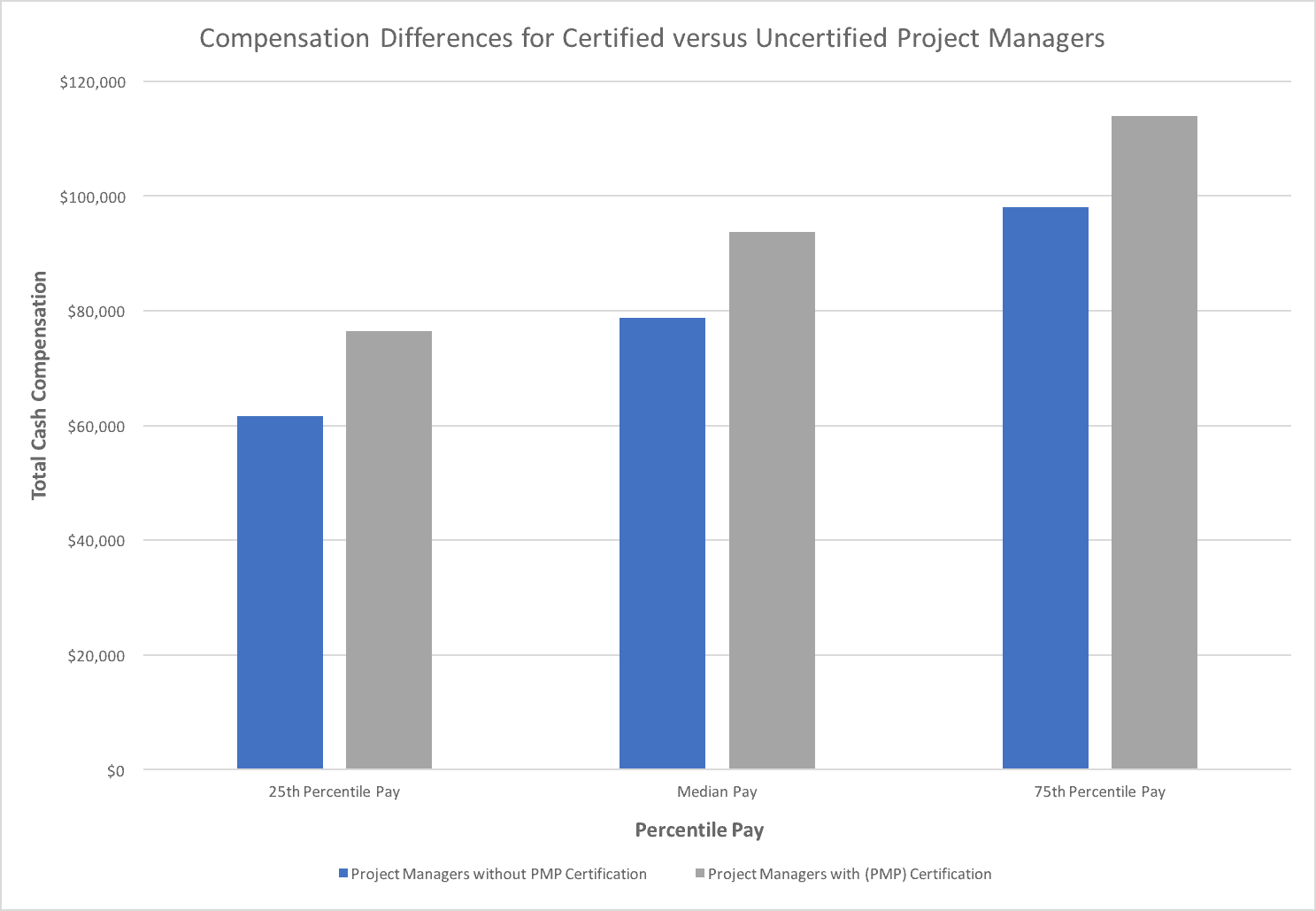What Is Project Management?
As defined by the Project Management Institute (PMI), project management is the “application of knowledge, skills, tools, and techniques” to meet project requirements. PMI is the largest organization to test and certify project management expertise. According to PMI’s publication A Guide to Project Management Body of Knowledge (PMBOK® Guide), project management processes fall into the following five groups, which loosely correspond to the phases of a typical project: initiating, planning, executing, monitoring and controlling, and closing the project.
Project managers call on their knowledge in the following areas to help assure project outcomes: integration, scope, time, cost, quality, procurement, human resources, communications, risk management, and stakeholder management. The PMI certification exam tests these areas of expertise.
Why Is Certification Important?
If you are an organization or corporation, you want the best outcomes for your projects and clients. If you are a project manager, you want that both for your job satisfaction and for your employer.
You also want to get the highest compensation possible, upward mobility, and a deep well of job opportunities. Obtaining your certification as a project manager can demonstrate your commitment to your career, implies that you possess a higher level of competency than project managers who haven’t sought certification, and also instills you with confidence (by studying for and passing a difficult exam).
The Project Management Institute (PMI) is a not-for-profit professional membership association and one of the larger organizations that tests and certifies project managers. Founded in 1969, they serve 2.9 million professionals around the world by helping them improve their job-related skills through training, testing, and certification.
PMI’s research demonstrates that when organizations implement project, program, and portfolio management practices, their projects are 2.5 times more successful and waste 13 times less money.
They have also found project outcomes improve when organiza
tions:
- Invest in ongoing project management training.
- Define a career path for project managers.
- Develop a formal process for updating project manager competencies.
The research also reveals that there is a:
- 31 percent increase in the number of goals met.
- 37 percent decrease in scope creep.
- 54 percent increase in the number of projects that come in within their budget.
- 38 percent decrease in projects deemed as failures.
Additionally, 66 percent more projects finish on time.
The ultimate goal - through education, certification, and ongoing professional development - is to increase the success of projects in all business sectors including technology, health, and the government.
When management problems arise and aren’t dealt with efficiently, the success of a project can suffer due to loss of time, money, and the effectiveness of a project’s outcome. Research by PMI points to a 36.5 percent increase in meeting original project goals and business intent when project management culture is a high priority compared to when it isn’t.
“This makes it incumbent on PMI to focus on helping our membership develop the types of skills employers want and need,” says Carter-Bey.
Source: The High Cost of Low Performance: How will you improve business results? © PMI - Used with permission
The Program Management Improvement and Accountability Act
This idea - that project management practices do make a positive impact on project outcome - has recently been recognized on a larger stage. In fact, it played a part in the passage of the Program Management Improvement and Accountability Act, signed into law on Wednesday, December 14, 2016 by President Barack Obama. This act is specifically designed to support significant advances in how the American government implements project management principles across projects done in the nation’s best interest.
Under the PMIAA, it is mandatory to use established project management best practices. This new law is expected to save tax dollars by preventing cost overruns and delays in completing important government work. The passage of this act points to the increasing importance of demonstrating project management expertise—both for employers, employees, and contractors. Getting certified is one way of demonstrating this knowledge.
PMP Certifying Organizations
Multiple organizations exist to test and certify project managers’ competence. Each certifying body has different requirements. Some of these organizations include:
The Project Management Institute (PMI)
PMI works on behalf of its membership to advance the global reputation of project management professionals.
Certification Requirements
Requirements to take their certification exam vary based on education. Project managers with a four-year secondary degree require three years of project management experience, with a total of 4,500 hours leading and directing projects, and 35 hours of project management education.
Project managers with a high-school diploma require five years of project management experience, 7,500 hours leading and directing projects, and 35 hours of project management education.
Examination
The PMP exam consists of 200 multiple choice questions and has a four hour time limit. Tests are given at Prometric Testing Centers worldwide. To schedule an exam appointment you’ll need to first pay the necessary fees and you must have your examination scheduling instructions. There are secure conditions for all examinations.
The exam content outline consists of multiple-choice questions about each phase (aka domain) of the project management process. The percent of questions about each domain is as follows:
- Initiating a project -13%
- Planning a project - 24%
- Executing a project - 31%
- Monitoring and controlling a project - 25%
- Closing a project - 7%
Certification
They confer a Project Manager Professional® (PMP®) certificate.
Recertification
Certificate holders must complete 60 professional development units (PDU’s) every three years to maintain certification.
More information
Download the Project Management Professional (PMP) Examination Content Outline and the PMP Credential Handbook for more information about eligibility and how to apply for certification.
While membership in PMI is not mandatory to take the exam, discounts are available for members. Additionally, all members receive a free PDF version of the PMBOK Guide, which is a key resource for study.
The AAPM American Academy of Project Management
AAPM is a global Board of Standards and Accreditation Council for project management industry professionals and related institutions.
Requirements
Applicants must have a college degree and three or more years of project management education and training to apply. However, waivers based on other life experience are available. Licensed engineers are pre-qualified for eligibility.
Certification
Using their standards, the AAPM issues a Master Project Manager ™ (MPM™) certification as well as a Certified International Project Manager™ credential.
International Project Management Association (IPMA)
The IMPA is active in over 60 countries including the U.S. and offers a four-level certification program, based on years of experience, which includes:
- Certified Project Management Associate
- Certified Project Manager
- Certified Senior Project Manager
- Certified Projects Director
Other Credentials
Certification exists for other kinds of professionals who have major project management requirements for their jobs. These certifications include:
Certified Associate in Project Management (CAPM) ® Certification
This is a basic-level certification in the project management domain.
Requirements
A secondary diploma (high school diploma), an associate’s degree or any global equivalent credential is required, along with 1,500 hours of project experience.
Examination
The exam consists of 150 multiple choice questions and lasts three hours.
Recertification
The CAPM exam must be retaken every five years.
PMI® Agile Certified Practitioner (PMI-ACP®) Certification – A project manager working on Agile technologies can obtain this certification.
Requirements
General project experience: 2,000 hours of general project experience working on teams. A current PMP® or PgMP® will satisfy this requirement, but is not required to apply for the PMI-ACP.
Agile-specific experience: 1,500 hours working on Agile project teams or with Agile methodologies. This requirement is in addition to the 2,000 hours of general project experience.
Additional experience: 21 contact hours of training in Agile practices.
Preparation for PMP Certification Examination
Depending on which organization’s certification you want, exam preparations may vary. Because the U.S. market is dominated by the PMI PMP certification, this section will focus on preparing to take the PMP exam.
PMI Registered Education Providers (REPs)
Many private education organizations, colleges, and universities teach core project management principles and practices that align to the Project Management Institute (PMI) Project Management Professional (PMP) certification exam. PMI authorizes them to teach these courses as well as issue professional development units (PDUs) and holds them to a high level of expectation with regards to the quality and effectiveness of their training.
“Our biggest focus with RFPs is the quality of instruction,” says Victor Carter-Bey, PMI Director of Certification. “We partner with RFPs to ensure value to our members. RFPs are responsible for meeting PMIs standards for learning, but it is up to them to decide what kind of courses to offer.”
Many different types of training are available and it is wise to find an RFP that uses a modality that best suits your learning style.
The University of Phoenix
The University of Phoenix is one of these RFPs. According to Dean Kevin Wilhelmsen, Ph.D., the University Of Phoenix School Of Business offers undergraduate project management programs (BSB/Project Management and CERT/Project Management).
The BSB program (BSB/Project Management) is available online and at select campus locations. The graduate program (MBA/PM or CERT/G-PM) are only available online. The courses within each of these programs count towards the education requirement to sit for the PMP exam, and can also apply towards any continuing education requirements (CEUs).
In addition, the University offers a non-credit Project Management Professional Test-Prep course, designed for students ready to take the PMP exam. The test-prep course is available as a non-credit option online or at select campus locations.
Like the University of Phoenix, many other educational institutions have a mix of different types of programs (in multiple modalities, including online, classroom, and short-term intensive).
Dean Wilhelmsen encourages potential students to look online for course availability.
Not all programs are available in every location or in both online and on-campus formats, so check with a University Enrollment Representative first.
Other educational institutions include:
- Villanova University
- Stanford University Advanced Project Management
- University of New Haven
- University of Washington Professional & Continuing Education
- Kaplan University MS in Management - Project Management
- UC Berkeley Extension
Instructing.com
Instructing.com, LLC, is an example of an RFP licensed by PMI to teach classes to prepare for the PMP certification exam. “For students who want to advance their careers and show they are serious about the profession of project management, we provide different types of learning situations to help them connect to the material easily,” says Joseph Phillips, Director of Education.
His company teaches the PMP Exam Prep Seminar, which provides 36.5 contact hours of project management education. This course includes videos and exercises in an online environment. There are also 400 PMP practice exam questions, 14 module exams (280 practice questions) covering every chapter of the PMBOK Guide, Fifth Edition. His company also teaches a PMP Exam Cram Seminar. This refresher course focuses on the technical information and test-taking strategies.
Instructors for this company have taught project management for organizations in the U.S., Belgium, France, Germany, the U.K., the Netherlands, and Italy.
There are many other private companies that teach courses, including:
The Project Management Training Institute
- Teaches in-person boot camps in cities throughout the U.S. Get a complete list of PMP Certification Training Locations
- On-demand PMP exam prep
- Teaches Instructor-led LIVE e-learning for PMP exam prep
Management Concepts
- A privately-held, second-generation company
- Teaches in-person classes in several locations around the U.S., and provides a free online tool that can help potential students develop an individual training plan
Whizlabs
- Based in New Delhi and Bangalore, India, Whizlabs provides free practice tests, an exam simulator, self-study training, and live online training for the PMP certification examination
- Learn in a classroom setting with PMP Exam Prep Boot Camp
- Study at your pace and receive occasional, mentored interaction with the PMP Guided Exam Prep
- Worldwide locations.
- Practice exams
- Live PMP classes
- On Demand PMP classes
Find A PMI Registered Education Provider
Choose from 734 educational organizations licensed by PMI in this list of Registered Education Providers.
Project Management Salaries With and Without PMP Certification
Generally speaking, project managers with certification earn more than project managers without certification. The data for the information below was collected from January 2015 through January 2017 from a PayScale salary survey of 15,918 project managers.
Return on Investment (ROI) for Your PMP
Before taking the plunge into becoming a certified project manager, pencil out your personal ROI for certification. Be sure to include the following factors:
- The cost of taking exam preparation classes
- The cost of study materials, including books
- Examination fee
- The cost of time away from the job and family while you take classes, study, and take the exam
- Membership fees for the certification entity
(*Be sure to factor in any savings due to membership discount for prep classes, exam fee, etc.) - The cost of maintaining your certification over time, which includes time for mandatory continuing education classes and volunteer work
- Increases in salary as you gain in project management experience*
- The length of time you’ve held the designation of PMP**
- The size of the team you manage***
While harder to financially quantify, also consider these variables:
- On-the-job satisfaction due to greater job proficiency
- Qualifying for future positions where a PMP certificate is a prerequisite
PMI Salary Information for Calculating ROI
Refer to this data available from PMI to help estimate if becoming certified as a project manager is financially worthwhile for you.
*The length of time you’ve held the position of project manager.
Earning Power Project: Management Salary Survey; Ninth Edition (p. 11)
**The length of time you’ve held the PMP certification.
Earning Power Project: Management Salary Survey; Ninth Edition (p. 12)
***The size of the team you manage.
Earning Power Project: Management Salary Survey; Ninth Edition
Here are more resources to help you evaluate ROI for project management training:
- Using Return on Investment to Evaluate Project Management Training
- Certification ROI
- Is the PMP a better investment than the MBA?
10 Test Preparation Books for the Project Management Professional Exam Recommended by Project Management Institute:
- PMI-ACP Exam Prep Questions, Answers, & Explanations
- PMP® Exam Prep, Eighth Edition - Updated: Rita’s Course in a Book® for Passing the PMP® Exam (ENGLISH)
- PgMP® Exam Preparation Study Guide & 220 Practice Questions & Answers – Second Edition
- PMP Exam Guidance
- PMP® Exam Simplified (5.1): Updated for 2016 PMP® Exam
- Achieve PMP® Exam Success, Fifth Edition, Updated January 2016: A Concise Study Guide for the Busy Project Manager
- PMP® Exam Practice Test and Study Guide, Tenth Edition
- PfMP® Exam Practice Tests and Study Guide
- PgMP® Exam Practice Test and Study Guide, Fourth Edition
- The PMBOK and PMP exam
For additional books visit the PMI website.
Smartsheet Offers the Features Project Managers Want
Empower your people to go above and beyond with a flexible platform designed to match the needs of your team — and adapt as those needs change.
The Smartsheet platform makes it easy to plan, capture, manage, and report on work from anywhere, helping your team be more effective and get more done. Report on key metrics and get real-time visibility into work as it happens with roll-up reports, dashboards, and automated workflows built to keep your team connected and informed.
When teams have clarity into the work getting done, there’s no telling how much more they can accomplish in the same amount of time. Try Smartsheet for free, today.







